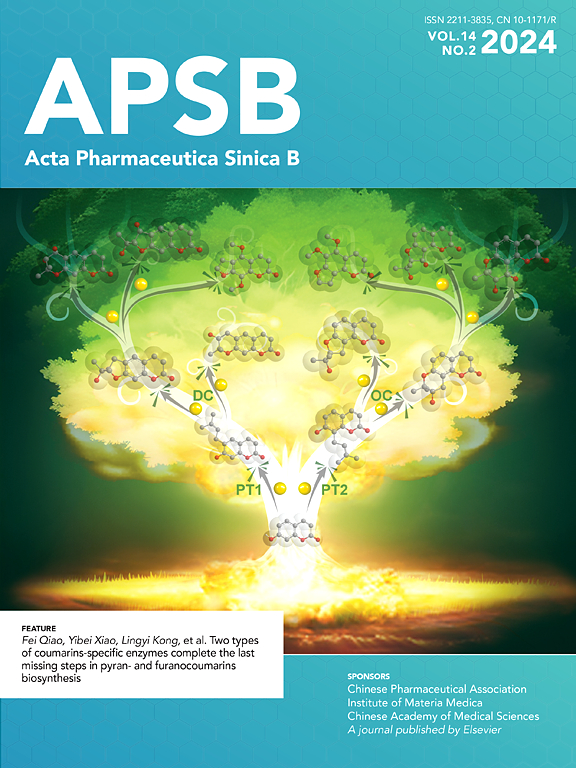在黑色素瘤免疫治疗中增强肿瘤渗透和延长循环的工程血小板衍生外泌体球
IF 14.6
1区 医学
Q1 PHARMACOLOGY & PHARMACY
引用次数: 0
摘要
细胞及其衍生的外泌体被广泛用作生物载体系统。细胞表现出优越的靶向特异性,并通过其丰富的表面蛋白阵列促进了长时间的循环,而外泌体由于其体积小,可以有效地跨越屏障并穿透肿瘤。然而,挑战仍然存在,细胞的大尺寸限制了组织的渗透,外泌体的靶向准确性有限,循环时间短。为了解决这些挑战,我们开发了一种称为外泌体球的新概念。这种方法包括结合用磷脂酰丝氨酸(PS)屏蔽的血小板衍生外泌体,并通过ph敏感键连接,用于药物输送应用。研究表明,与外泌体相比,外泌体球体通过上调CD47表达和屏蔽磷脂酰丝氨酸来改善血液循环,从而最大限度地减少免疫清除。此外,p -选择素表达的增加促进了对循环肿瘤细胞的粘附,从而提高了靶向效率。到达肿瘤部位后,外泌体球体的腙键在酸性肿瘤微环境中被质子化,导致外泌体分解成均匀大小的外泌体,与血小板相比,能够穿透更深的肿瘤。这些发现表明,外泌体球体解决了这些挑战,并为有效和精确的给药提供了巨大的潜力。本文章由计算机程序翻译,如有差异,请以英文原文为准。

Engineered platelet-derived exosomal spheres for enhanced tumor penetration and extended circulation in melanoma immunotherapy
Cells and exosomes derived from them are extensively used as biological carrier systems. Cells demonstrate superior targeting specificity and prolonged circulation facilitated by their rich array of surface proteins, while exosomes, due to their small size, cross barriers and penetrate tumors efficiently. However, challenges remain, cells’ large size restricts tissue penetration, and exosomes have limited targeting accuracy and short circulation times. To address these challenges, we developed a novel concept termed exosomal spheres. This approach involved incorporating platelet-derived exosomes shielded with phosphatidylserine (PS) and linked via pH-sensitive bonds for drug delivery applications. The study demonstrated that, compared with exosomes, the exosomal spheres improved blood circulation through the upregulation of CD47 expression and shielding of phosphatidylserine, thereby minimizing immune clearance. Moreover, the increased expression of P-selectin promoted adhesion to circulating tumor cells, thereby enhancing targeting efficiency. Upon reaching the tumor site, the hydrazone bonds of exosome spheres were protonated in the acidic tumor microenvironment, leading to disintegration into uniform-sized exosomes capable of deeper tumor penetration compared to platelets. These findings suggested that exosome spheres addressed the challenges and offered significant potential for efficient and precise drug delivery.
求助全文
通过发布文献求助,成功后即可免费获取论文全文。
去求助
来源期刊

Acta Pharmaceutica Sinica. B
Pharmacology, Toxicology and Pharmaceutics-General Pharmacology, Toxicology and Pharmaceutics
CiteScore
22.40
自引率
5.50%
发文量
1051
审稿时长
19 weeks
期刊介绍:
The Journal of the Institute of Materia Medica, Chinese Academy of Medical Sciences, and the Chinese Pharmaceutical Association oversees the peer review process for Acta Pharmaceutica Sinica. B (APSB).
Published monthly in English, APSB is dedicated to disseminating significant original research articles, rapid communications, and high-quality reviews that highlight recent advances across various pharmaceutical sciences domains. These encompass pharmacology, pharmaceutics, medicinal chemistry, natural products, pharmacognosy, pharmaceutical analysis, and pharmacokinetics.
A part of the Acta Pharmaceutica Sinica series, established in 1953 and indexed in prominent databases like Chemical Abstracts, Index Medicus, SciFinder Scholar, Biological Abstracts, International Pharmaceutical Abstracts, Cambridge Scientific Abstracts, and Current Bibliography on Science and Technology, APSB is sponsored by the Institute of Materia Medica, Chinese Academy of Medical Sciences, and the Chinese Pharmaceutical Association. Its production and hosting are facilitated by Elsevier B.V. This collaborative effort ensures APSB's commitment to delivering valuable contributions to the pharmaceutical sciences community.
 求助内容:
求助内容: 应助结果提醒方式:
应助结果提醒方式:


